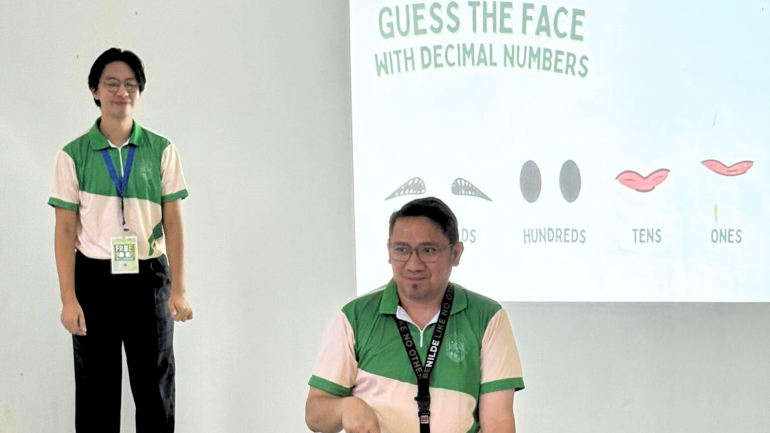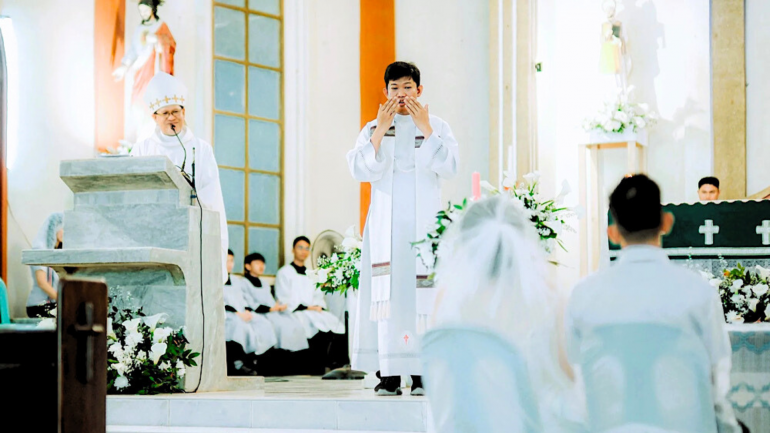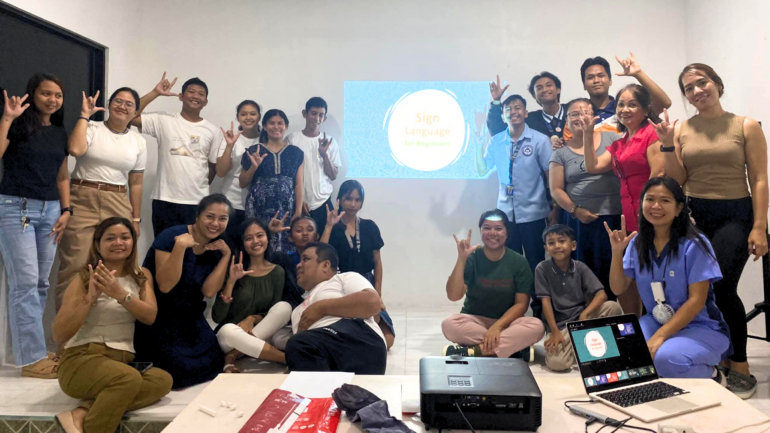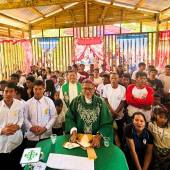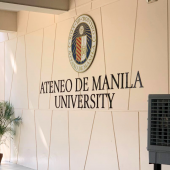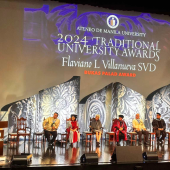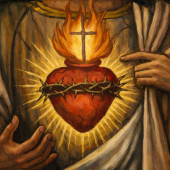Fr. Khim J. Caermare’s journey of ministering to deaf in Diocese of Dipolog
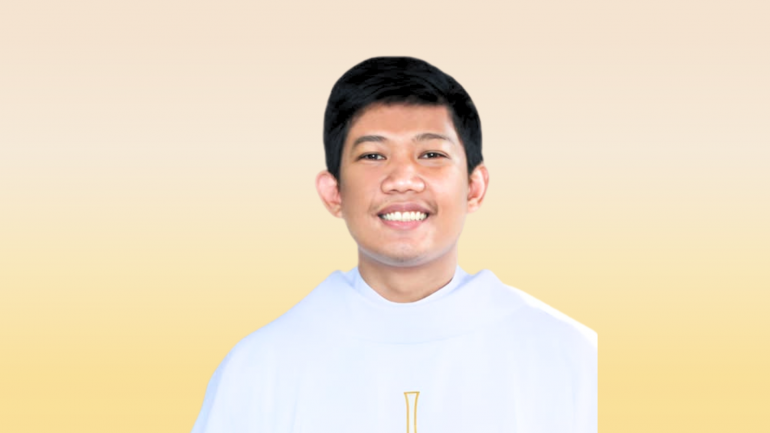
Fr. Khim J. Caermare is the founder and spiritual director of the Ministry with the Deaf in the Diocese of Dipolog, Zamboanga del Norte. He studied theology at the University of Sto. Tomas (2021), Filipino Sign Language at De La Salle College of St. Benilde in 2019, MA in Pastoral Ministry at Ateneo de Manila University (2018), and AB in Philosophy at St. Vincent College Inc. (2013). He was ordained on May 25, 2022. RVA News met him to find out more about his ministry.
Why did you study sign language?
After my short encounter with the deaf during Pope Francis’ visit in 2015, I spent a year in Regency as a Special Religious Education (SPRED) volunteer in Welcome Home Foundation Inc., a non-profit, non-governmental organization serving the deaf of the Philippines in education, ministry, and outreach 2015.
There I learned, relearned, and unlearned with the deaf. Little did I know my vocation took a wonderful turn—from emptiness to fullness. After I resumed my seminary formation, I enrolled in Filipino Sign Language and Filipino Deaf Culture at De La Salle College of St. Benilde completed the course in 2019.
What do your current pastoral assignments consist of?
Your current pastoral assignments include teaching, chaplaincy, retreat giving, providing pastoral care for students, people deprived of liberty (PDL), the deaf, and assisting with administrative tasks.
Why are you interested in doing ministry to the deaf?
In our diocese, no one is doing it. As a seminarian, I witnessed deaf churchgoers who struggled to understand the mass. My experience leads me to ask, how will the deaf encounter Jesus? There’s a need for continued commitment to the inclusion and empowerment of our Catholic Deaf community. Jesus' shout of "Ephphatha" was for the deaf man and his contemporaries, but it also inspires us to be open to each other and the ministry the deaf bring to our church.
When did you start it?
After my first encounter with the Deaf from Welcome Home Foundation Inc., they were invited to the Gatherings of Family during the Papal Visit, and they stayed in our seminary while in Manila. The summer of 2015 took place in Bacolod City. A group of seasoned deaf catechists patiently read my slow, shaky hands, trying to explain the theology of incarnation. After so much (mis)interpreting, the deaf thanked me and signed, “How beautiful are the hands that “speak” of God’s love.” Tears welled in my eyes, and I felt a heart full of gratitude for God’s seemingly difficult grace.
What has been your experience of doing ministry to the deaf?
Allow me to share one. Have you ever wondered how the deaf access the sacrament of reconciliation? The Deaf have limited options and accessibility to confession due to their (dis)ability and the limited number of priests skilled in Filipino signed language. Our deaf write their confession on paper and hand them to the priest. We provide our confessors with a pen and a whiteboard for writing their counsel and penance. Those who have speech can lipread. Lipreading the priest’s response can be challenging, but one can always ask for clarification in writing if needed. The church allows those who wish to communicate in sign language to use an interpreter. The interpreter is bound to secrecy according to the seal of confession, as is the priest (canon law 984). The need for signing priests in every diocese is ever-present but often unmet. We dream of a more inclusive church where the Kingdom of God includes all who sign in an intimate sacrament where all encounter the Risen Christ. As a priest, I embrace the deaf when they confess, demonstrating that God has forgiven their sins.
What are the challenges you face doing ministry to the deaf or people with other disabilities?
The first of many challenges is that they do not speak the same language as our church leaders. The Church often overlooks the deaf due to the invisibility of their handicap. With the limited number of signing priests, many deaf people struggle to have access to the sacraments, which hearing individuals often take for granted. There are insufficient resources and a scarcity of dedicated volunteers for the ministry. Not surprisingly, deaf Catholics have been joining other denominations, such as Jehovah’s Witnesses, Mormons, and Baptists.
What are the programs that you undertake under your ministry to the deaf?
Throughout these years we marveled at how God sustains the Deaf Ministry through the kindness of our collaborators, near and far. We had a wonderful and successful collaborative project with Setsunan University in Osaka, Japan, last year that climaxed in the presentation of the first-ever Deaf Festival in the region, which aims to bring new hope to be visualized and experienced for all generations to come by breaking the stereotypical and negative constraints of disruptive silence. Deaf people are not liabilities but nurturing power. This coming May 26–30, 2025, a Deaf Caravan is proposed by the De La Salle College of St. Benilde for our deaf teachers and local volunteers as part of their advocacy to improve Deaf education in the country. They will conduct a series of training and workshops in Filipino Sign Language, Leadership Training for the Deaf, Deaf Awareness, Human Sexuality, Liturgy and Sign Language, and other support services for the Deaf.
Currently, we are reviving our Basic Filipino Sign Language class in the parish of Dipolog and Dapitan to facilitate communication, encounter, and inclusion with our Deaf. We are actively collaborating with our local hospitals and policemen in facilitating deaf awareness and Filipino sign language. After the Deaf wedding, we are heartbroken to share that the couple, Mary Jane and Ian, experienced a miscarriage. She faced complications and required emergency surgery at the ER. Her father's concrete grave box now holds her baby's resting place. We sat, cried, and wrestled with how she was able to comprehend the new suffering she experienced. We wondered if she knew other women in her life who had experienced miscarriage or had heard stories about it, which could help her seek support and find a way to process this isolating experience. Deaf women are at higher risk of pregnancy complications and adverse birth outcomes, including miscarriage, compared to hearing women, potentially due to barriers in accessing and understanding healthcare information. Poor communication can also result in a lack of awareness about healthy behaviors during pregnancy and adherence to treatment plans.
We have our regular Interpreted Mass on Sundays in the parishes of Dipolog and Dapitan. We have our ongoing deaf project, “Love Made Visible Through Many Sweets,” where the deaf bake delicious sweets for sale on Sundays for churchgoers. We have made beautiful wooden food carts for our sweets and cart rentals. This initiative helps deaf youth gain firsthand experience of the realities of work, economically empowers them, and enhances their confidence and social skills.
How many deaf people are in the Philippines or your province or diocese?
In 2020, the Philippine Statistics Authority (PSA) estimated that 1,784,690 individuals in the Philippines had hearing difficulties. This number includes deaf people, hard-of-hearing people, and those with other hearing impairments.
According to the 2010 National Statistics Office Zamboanga del Norte QuickStart, the province has 1,279 deaf people (334 with total deafness, 438 with partial deafness, and 507 hard of hearing). In our diocese, we serve about 80 deaf young adults.
What are the challenges deaf people face? How do they overcome barriers?
Our deaf have long been experiencing social struggles due to an unsupportive environment. The lack of education is a significant issue; in our province, special education (SPED) schools only provide services up to grade school, and if deaf students continue to high school, they must rely on lipreading by their teachers to learn. The scarcity of employment opportunities is a giant barrier to improving the economic status of the Deaf. The unemployment rate among the Deaf has reached a critical level. Sadly, our LGUs do not have concrete programs that encourage capitalists to hire deaf individuals. Employers prefer to hire those without disabilities, and poverty and lack of access to education prevent the deaf from achieving economic stability and independence. Our unsupportive environment failed to provide equal access to quality education and social integration.
Aware of these herculean challenges, the Diocese of Dipolog ministers with deaf laborers so that they too may hear and understand the Word of God. To the extent that our resources allow, we provide deaf scholarship, counseling, and catechism, and help them in situations of abuse (1 out of 3 deaf girls are molested [The Philippine Deaf Resource Center, PDRC]). We help the Filipino Deaf build a stronger community and culture, as they do more despite hearing less.
How many priests are there in the Philippines who are skilled in sign language? They also perform ministry in various dioceses.
There is no readily available data on the exact number of priests in the Philippines who know Filipino Sign Language (FSL), but I know some priests who dedicated themselves to the service of the Deaf community. I know Fr. Kristian Benjamin in Dumaguete, who serves the Deaf. They also perform ministry in various dioceses. President and founder of the St. Francis of Assisi Deaf Center, Fr. Gem Penatrante provides services to the Deaf in Legazpi. Fr. Roel Penatrante provides services to the Congregation of Holy Redeemers (Redemptorist).
Cardinal Luis Antonio Tagle spoke about the importance of sign language and the need for a greater understanding of the deaf community. Pope Francis himself, during his visit to the Philippines, learned a few phrases of FSL, demonstrating a commitment to communication with the deaf community.
Could you provide any concluding remarks?
The Church finds its identity when it fully integrates itself with our marginal people, the homeless, the poor and destitute, and the deaf. The central meaning of Jesus’ ministry is bound up with the fact that he sought the company of people who, for one reason or another, were forced to live on the fringes of society. He made them the special object of his attention, declaring that the last wound would be first and the humble would be exalted in his Father’s kingdom.
Radio Veritas Asia (RVA), a media platform of the Catholic Church, aims to share Christ. RVA started in 1969 as a continental Catholic radio station to serve Asian countries in their respective local language, thus earning the tag “the Voice of Asian Christianity.” Responding to the emerging context, RVA embraced media platforms to connect with the global Asian audience via its 21 language websites and various social media platforms.





